Befriending Boundaries
by Gary Gardner
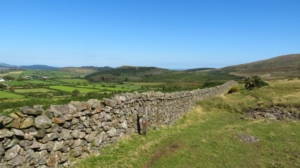
Restriction or protection? (Colin Park, Geograph)
One of the most difficult adjustments industrial-country citizens will make in the steady state economy is accepting limits on our activities. Steady state economies will not be the Wild West, beyond the frontier where anything goes. We will learn to live within limits, a difficult reality for peoples accustomed to an open-ended understanding of freedom. In a “full world” where we bump up against the limits of our planet’s resources, boundaries will either be accepted willingly or imposed on us by the physical and resources limits in which we live.
If this sounds depressing, it’s likely because the resource- and energy-saturated twentieth century spoiled us into forgetting that boundaries are long part of the human experience. What’s more, boundaries and the restraint they require can help us to become our best selves. Far from succumbing to depression, we’d do well to view circumscribed activity as a boon to our development.
Restraint: Not a New Idea…
Philosophers and spiritual leaders across cultures and throughout history have taught the importance of channeling human energies within ethical boundaries. This is often expressed as a preference for avoiding extremes. The Roman playwright Terence counseled “moderation in all things.” Buddhist philosophy and Baha’i teachings stress “the middle way,” avoiding excess and scarcity equally. And Mahatma Gandhi drew on his Hindu heritage to elaborate his own “seven deadly sins,” blessings that become insidious without boundaries to guide them. They are worth listing:
- Wealth without work
- Pleasure without conscience
- Science without humanity
- Knowledge without character
- Politics without principle
- Commerce without morality
- Worship without sacrifice.
Some thinkers go further—much further. “Geologian” (geologist and theologian) Thomas Berry argued that restraint is more than merely a moral adornment on human activities, it is a fundamental ingredient of progress dating to the origins of the universe. Berry notes that gravity was essential at the Big Bang to shape a creative universe. The tremendous energy released at that formative moment needed the constraining power of gravity to shape matter into a productive cosmos. Energy alone is diffuse and produces nothing, while material alone is rigid and lifeless. But in proper balance, the two hold tremendous creative potential. For this reason, Berry argues, constraints, restraint, and boundaries are best understood as “liberating and energizing” rather than confining.
…But a Neglected One
The practical lesson of this wisdom is that we develop best within limits. Commercials and political campaigns argue otherwise, but surely we grasp this essential truth: Development without limits is not development at all. It’s extravagance or immoderation or sloth or some other attribute most of us would not want to claim as our own.
We grasp this in much of our lives. The aspiring athlete limits her free time, her food choices, and her late nights, recognizing that such boundaries are key to realizing her potential. Boundaries bind, yes, but they also launch us (we bound) further than we would otherwise go. They develop us. We understand this, except when it comes to the economy. There, boundaries are too often seen as handcuffs.

Out of Bounds? (Picryl, CCO 1.0)
I once heard a leader in the sustainability field remark that “Development is anything that increases your options.” The assertion rings true to a point, but it’s also unsettling if it means that development is open-ended or boundarly-less. Increasing one’s options exhibits diminishing returns, and having more options eventually curdles into harm. In the USA, the plethora of food options, convenience options, gun options, and get-rich options, to name a few, are arguably unraveling the country’s development. The recent decline in life expectancy is striking evidence of our backward trajectory.
A few years ago, I counted 162 different brands, sizes, and types of breakfast cereal in our neighborhood supermarket—one side of an entire aisle. I wondered if we were less developed with only 100 options. And should we be shooting for 200? The question is especially needling given that many cereals are simply vehicles for delivering sugar fixes to kids. Is it progress to expand this debilitating inventory any further?
Contrast the cereals options with the life choices we describe as character-building, as developmental. Choosing a job, buying a house, committing to a spouse. These choices are not defined by an abundance of options, nor do we have a world of time to make up our mind. In fact, isn’t the paucity of options what gives these life choices their developmental character?
Start with Energy Boundaries
The critical need for gravity to shape the energy of the Big Bang into a creative universe ought to provide a general framework for how we think about energy (and all resources) today. But our stance toward energy is anything but restrained. Too often we hear that cheap, abundant energy is the holy grail of energy development. The current enthusiasm for mining helium-3 on the moon is a good example. Michelle Hanlon, Director of the Center for Air and Space Law at the University of Mississippi, observes gleefully that helium-3, which is scarce on earth but plentiful on the moon, “could seriously power the Earth, the entire Earth, for centuries.”
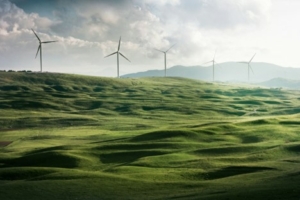
Clean energy, sure. Properly circumscribed? (Apollinary Kalashnikova, Unsplash)
If the problem here is not evident, recall the maxim of Lord Acton: “Power tends to corrupt, and absolute power corrupts absolutely.” Acton spoke of political power, but it’s easy enough to apply his insight to physical power—our capacity to do work, to move matter. Virtually unrestrained use of fossil fuels allowed industrial societies to move a lot of matter over the last century, to the tune of 100 million tons of materials annually in the past few years. That’s a lot of habitat lost, air and water polluted, and often, resources squandered. Our power is spoiling our prospects.
Framed this way—that fossil fuels are problematic as much for the power they hold as for the pollution they cause—it’s clear that unbounded use of helium-3, nuclear fusion, or any other abundant source of energy is not a cure-all. Renewables can help address our pollution and climate problems, but if humanity wields them as we did fossil power, we’ll continue to do grave damage to natural systems beyond the climate.
Who Sets the Boundaries?
It’s reasonable to wonder who will set economic boundaries in the steady state economy. Boundary making will undoubtedly be complex and will differ by geography, historical context, and culture. But given the ecological damage driving many dimensions of the polycrisis, it makes sense to give ecological factors a high priority in boundary drawing.
Yardsticks available to help with this work include the planetary boundaries metrics, which define a “safe operating space” for humanity regarding greenhouse gas emissions, water use, and other areas of economic activity. The ecological footprint metric can also help, through its per capita measures of renewable resource use. And the trophic theory of money offers an overarching boundary for economic growth, stopping any expansion that proceeds faster than the sustainable growth of agriculture, forestry and mining, the trophic base of the economy.
Softer boundaries would be defined culturally and politically. Tim Jackson has long written of the need to create economies of “care, craft and culture” that enhance human well-being. Care consists of services that support wellbeing, including health care, education, and social services. Craft refers to appreciation of the material world we inhabit, manifested through an ethic of sufficiency, conservation of materials, and skills in building and repair. Culture refers to creating works of art that support communities.
This is an economy of wellbeing, for humans and nature alike. Its success will be rooted heavily in its capacity to set and maintain boundaries that advance the prospects of all humans for dignified lives of sufficiency and cultural richness while tending to the needs of the natural world. In such a world, boundaries will be seen not as irksome handcuffs, but as protective tools that advance the common good.
Gary Gardner is CASSE’s Managing Editor.


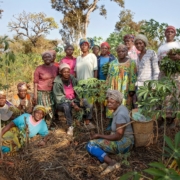

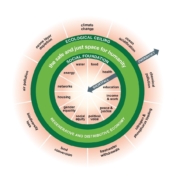
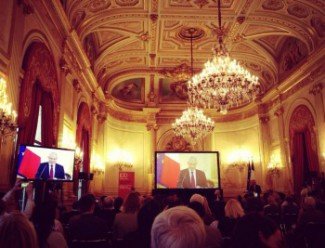


Great thought provoking article Gary. The economy of wellness must prevail. the alternative economy of death is in no one’s best interest.
In our lives the overridung boundary; the scarce commodity is time. 17 years ago, not so long ago, while 17 years ahead will quickly pass. Use the scarce time well. Support social business sector so it can compound grow, competing and beating the growth economy to deliver that economy of wellness. Viral change is a new tech driven phenomenon. Tech can be harnessed to deliver a cultural buy in so that the wellness economy.can swiftly prevail. Voluntary personal environmental care metrics. shared scores, personal reputations enhanced within communities that protect that, life saving, wellness economy.
Thanks, Conor. You’ve offered a tantalizing sketch of a steady state future, especially your understanding of a potentially constructive role for some technologies. I would love to hear more about that in your future comments!
I had not thought of boundaries this way, but there’s a lot of truth here.
Since boundaries are absolutely unavoidable in the universe, it seems logical that knowing what boundaries exist, and then *respecting* those boundaries, is a wise thing to do. And leads to greater happiness as a human, than if one ignored the boundaries that exist in our existence.
A trivial but very real example that comes to mind for me is knowing my own physical boundaries for lifting weights and running and so on. It’s tempting to heed the call of some self-proclaimed fitness gurus, and “block out the pain, push through boundaries!”. Wow! Great! That must lead to faster results, and better performance! Right!?
Um, no, actually that tends to lead to more injuries and setbacks and worse levels of health and physical performance. I have found – and a fellow runner who was on the US Olympic team confirmed – you need to respect your own boundaries. Live within your boundaries and you will, gradually, get stronger and faster in a sustainable way. Pushing beyond boundaries = “I can’t shake this knee injury and I feel crappy”. Be wise about boundaries = “That was good long run, I feel great.. let me check my elapsed time.. oh dang, I did better than I thought, sweet!”
Boundaries are our friends, if we can just recognize them as such.
Cole, you’ve taken the “friend” dimension of boundaries to a deeper place than I had thought of. The personal nature of some boundaries, and boundaries as feedback mechanisms, are rich veins to mine further. Thanks for expanding the boundaries of boundaries!